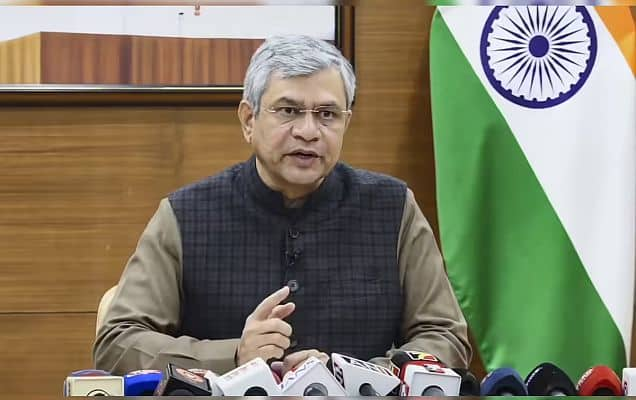Namaskar,
The Law Minister of the country, Shri Ravi Shankar Prasad ji, Chief Minister of Gujarat Shri Vijay Rupani ji, Supreme Court Justice Shri M.R. Shah ji, Chief Justice of Gujarat High Court Shri Vikram Nath ji, Ministers of Gujarat Government, all honorable judges of Gujarat High Court, Solicitor General of India Shri Tushar Mehta ji, Advocate General of Gujarat Shri Kamal Trivedi ji, all respected members of Bar, ladies and gentlemen!
Congratulations to all of you on the occasion of the diamond jubilee of Gujarat High Court. In the last 60 years, both the Gujarat High Court and the Bar have made a unique identity with their legal understanding, erudition and intellectualism. The conscientiousness with which the Gujarat High Court has worked for truth and justice, the readiness that it has shown for its constitutional duties, has strengthened both the Indian judicial system and the democracy of India. A postage stamp has been released today to commemorate the memorable journey of the Gujarat High Court. I take this opportunity to convey my best wishes to all your Excellencies and to the people of Gujarat.

Excellencies, the responsibility given to the Legislature, Executive and Judiciary under our Constitution is like oxygen for our Constitution. Today, every countryman can say with satisfaction that our judiciary has firmly fulfilled its responsibility to protect the oxygen of the Constitution. Our judiciary has always strengthened the Constitution itself by making a constructive and positive interpretation of the Constitution. Whether it is the protection of the rights of the countrymen, or the private freedom, or the situations where the country's interests had to be accorded top priority, the judiciary has recognized and fulfilled these obligations.
You all know very well that the rule of law in Indian society has been the basis of our culture for centuries of civilization and social fabric. It is written in our ancient scriptures: 'न्यायमूलं सुराज्यं स्यात्' i.e., the root of good governance is in justice, the rule of law. This idea has also been part of our culture since time immemorial. The same mantra also gave moral strength to our freedom struggle and the same idea was put at the top of the Constitution by our founding fathers also. The Preamble to our Constitution is an expression of the same resolution of the rule of law. Today, every countryman is proud that our judiciary has always given strength and direction to this spirit of our Constitution and these values continuously.

This trust in the judiciary has instilled a confidence in the minds of our ordinary man and has given him the strength to stand up for the truth. And when we discuss the contribution of the judiciary towards the journey of the country since independence, it is also necessary to discuss the contribution of the Bar. This glorious heritage of our judicial system stands on the pillar of the Bar. For decades, the Bar and the judiciary have been fulfilling the fundamental objectives of justice in our country. The notion of justice that our Constitution has put forward, the ideals of justice that have been part of our Indian culture, that justice is the right of every Indian. Therefore, it is the responsibility of both the judiciary and the government to put together the world class justice system in the world's largest democracy. Our justice system should be something that is accessible to the person at the bottom of the society, where justice is guaranteed to every person and justice is guaranteed in time.
Today, like the judiciary, the Government is also making continuous efforts to fulfill its duties in this direction. The democracy of India and our judiciary have protected the right to justice of Indian citizens even in difficult times. We have seen a good example of this once again during the Corona global pandemic. During this calamity, if the country has exhibited its potential on the one hand, our judiciary has also presented an example of its dedication and devotion on the other hand. The way Gujarat High Court started hearings through video conferencing in the early days of the lockdown, the way services like SMS call-out, e-filing of cases, and 'Email My Case Status' were introduced, the court's display board started streaming on YouTube, every day judgments and orders were uploaded on the website, all of these have proved how adaptive our justice system is and how comprehensive is its efforts to provide justice.

I am told that the Gujarat High Court has also become the first court to live streaming court proceedings, and the concept of open court, which has been debated for a long time, has also been realized by the Gujarat High Court. It is a matter of satisfaction for us that the digital infrastructure that the Law Ministry developed under the e-Courts Integrated Mission Mode Project helped our courts to work as virtual courts in such a short time. The Digital India Mission is rapidly modernizing our justice system today.
More than 18,000 courts have been computerized in the country today. The e-proceeding has gained momentum in all courts since the Supreme Court granted legal sanctity to video conferencing and tele-conferencing. It is glorifying to hear that our Supreme Court has been crowned as the only court in the world which has heard the highest cases through video conferencing. Our high courts and district courts have also heard maximum cases through video conferencing during the Covid period. The e-filling facility of cases has also given a new dimension to ease of justice. Similarly, a Unique Identification Code and QR code is being given to every case by our courts today. This has not only made it easier to get all the information related to the case, but it has also laid a strong foundation for the National Judicial Data Grid. Lawyers and litigants can view all cases and orders with just a click through the National Judicial Data Grid. This ease of justice is not only improving the ease of living of our citizens, but it has also increased the ‘ease of doing business’ in the country. This has led to the confidence in the foreign investors that their judicial rights in India will be protected. The World Bank has also praised the National Judicial Data Grid in its Doing Business Report of 2018.

Excellencies,
The Supreme Court's e-committee is working closely with the NIC to ensure rapid growth of the ‘ease of justice’ in India in the days to come. Work is on to incorporate features like cloud based infrastructure along with formidable security. The possibilities of using Artificial Intelligence in judicial processes to make our justice system future ready are also being explored. Artificial Intelligence will also increase efficiency and speed of judiciary. The country's Atmanirbhar Bharat campaign is going to play a big role in these efforts.
India's own video conferencing platforms are also being encouraged under the Atmanirbhar Bharat campaign. In order to reduce the digital divide in the country, e-service centres are also being opened in high courts and district courts to help the common people. We have all seen that in this difficult time of the pandemic, online e-lok adalats have also become a new normal. Incidentally, it was Gujarat where the first Lok Adalat was set up in Junagadh 35-40 years ago. Today, e-Lok Adalat is becoming a major medium of timely and convenient justice. So far lakhs of cases have been reported to e-lok adalats in 24 states of the country, and they are also being disposed of. This speed, facility and the confidence is the demand of our judicial system today.
Gujarat is also proud of its contribution on one more issue. Gujarat was the first state to start the tradition of the evening court and took many initiatives for the betterment of the poor. In any society, justice defines the significance of rules and policies. Justice brings certainty among the citizens, and a relaxed society thinks about progress, takes the resolutions and progresses by making efforts. I am sure our judiciary and all the senior members of the judiciary will continue to empower the judicial power of our Constitution. With this power of justice, our country will move forward and the dream of a self-reliant India will be realized through our efforts, collective power, willpower and from our continuous practice. With these good wishes, congratulations to all of you once again on the diamond jubilee! Many greetings!
Thanks!













